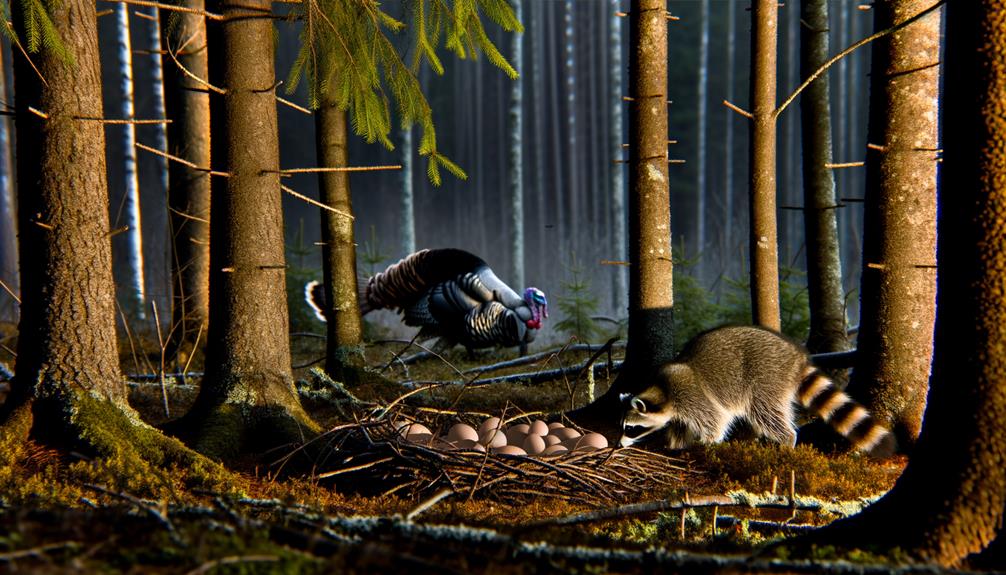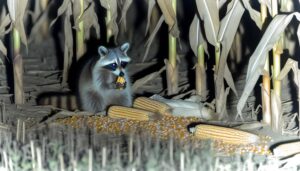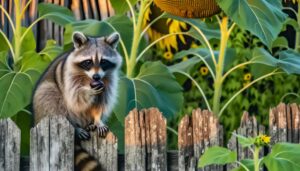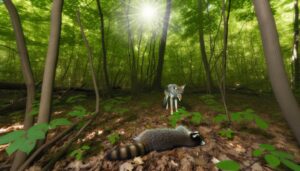How Do Raccoons Eat Turkey Eggs?
Yes, raccoons do eat turkey eggs. As opportunistic omnivores, raccoons have a highly adaptable diet that includes eggs from various bird species, including turkeys.
Their dexterous front paws and nocturnal foraging behavior make them particularly effective at locating and consuming these eggs. Field studies and camera data frequently capture raccoons raiding turkey nests, leading to significant egg loss.
This predation has a notable impact on turkey populations, reducing hatchling survival rates and affecting overall population recovery. By examining further, one can gain deeper insights into raccoons' dietary practices and their substantial effect on wildlife ecosystems.

Key Takeaways
- Raccoons are known predators of turkey eggs.
- Field camera data frequently captures raccoons preying on nests.
- Raccoon scat often contains turkey eggshell remnants.
- High raccoon activity correlates with disturbed turkey nests.
- Predation by raccoons significantly impacts turkey populations.
Raccoon Dietary Habits

Raccoons are omnivorous animals with a highly adaptable diet that includes a variety of plant and animal matter, which allows them to thrive in diverse environments. Their dietary repertoire encompasses fruits, nuts, seeds, insects, small mammals, and amphibians.
Additionally, raccoons are known to consume human food waste, making them frequent visitors to urban areas. Their foraging behavior is opportunistic; they often exploit whatever resources are most readily available in their habitat. This adaptability is facilitated by their dexterous front paws, which enable them to manipulate objects and access food sources that are otherwise difficult to obtain.
Understanding the broad spectrum of their diet is essential for comprehending their ecological impact and interactions within various ecosystems.
Natural Predators of Turkey Eggs
In examining the dietary habits of raccoons, it becomes pertinent to explore the various natural predators of turkey eggs, as these eggs form a part of the raccoon's opportunistic diet. Numerous species pose a threat to turkey eggs, impacting their survival rates. Predators include mammals, reptiles, and avian species. Mammals such as raccoons, skunks, and opossums are adept at locating and consuming these eggs. Reptiles like snakes also prey on turkey eggs, utilizing their stealth. Birds, including crows and ravens, are known to target nests when given the opportunity.
| Predator Type | Examples |
|---|---|
| Mammals | Raccoons, Skunks, Opossums |
| Reptiles | Snakes |
| Birds | Crows, Ravens |
| Other Predators | Foxes, Coyotes |
Raccoon Behavior and Habitats

Exhibiting a high degree of adaptability, raccoons thrive in a diverse array of habitats ranging from dense forests to urban areas. They are highly versatile, occupying environments such as woodlands, marshes, and suburban neighborhoods.
Raccoons display nocturnal behavior patterns, foraging primarily at night. They are omnivorous, with diets that include fruits, nuts, small animals, and human refuse. Raccoons are known for their dexterous front paws, which they use to open containers and manipulate various objects. Their habitats often include proximity to water sources, which aids in their foraging activities.
Typically, raccoons establish dens in hollow trees, burrows, and even attics, demonstrating their remarkable ability to coexist with human developments. This behavioral flexibility underscores their success in diverse ecosystems.
Evidence of Egg Predation
Their omnivorous diet and nocturnal foraging behavior make raccoons opportunistic predators of turkey eggs, as evidenced by numerous field studies and wildlife observations. Researchers have documented raccoons raiding turkey nests, leading to significant egg losses.
Key pieces of evidence include:
- Field Camera Data: Motion-sensor cameras placed near turkey nests have captured raccoons actively preying on eggs during nighttime hours.
- Eggshell Remnants: Analysis of raccoon scat and nest sites often reveals fragments of turkey eggshells, confirming ingestion.
- Nest Disturbance Patterns: Comparative studies of disturbed and undisturbed nests show a higher frequency of raccoon activity in areas where eggs have been predated.
These findings confirm that raccoons are a significant factor in the predation of turkey eggs.
Impact on Turkey Populations

The predation of turkey eggs by raccoons can lead to substantial reductions in turkey populations, as evidenced by decreased hatchling survival rates and subsequent population declines.
Studies indicate that raccoons, being opportunistic feeders, target turkey nests, significantly impacting reproductive success. The correlation between high raccoon densities and low turkey recruitment rates underscores the predator's role in limiting population growth.
Observational data reveal that raccoons consume substantial numbers of eggs, thereby reducing the number of poults that reach maturity. This predation pressure, combined with other environmental stressors, can severely constrain turkey population recovery efforts.
Consequently, understanding the dynamics of raccoon predation is pivotal for wildlife managers aiming to maintain balanced turkey populations within their natural habitats.
Protective Measures for Nests
Implementing effective protective measures for turkey nests is essential to mitigate the impact of raccoon predation and enhance hatchling survival rates. By employing targeted strategies, conservationists can greatly improve the reproductive success of turkey populations.
Key measures include:
- Nest Enclosures: Constructing physical barriers around nests can prevent raccoons from accessing eggs. Materials such as wire mesh can be used, ensuring ventilation while providing robust protection.
- Habitat Management: Modifying the landscape to reduce raccoon habitat near nesting sites can decrease predation rates. This includes controlling vegetation and reducing food sources that attract raccoons.
- Predator Control Programs: Implementing controlled trapping and relocation of raccoons can directly reduce the predation pressure on turkey nests. This should be conducted under ethical guidelines and local wildlife regulations.
Conclusion
Studies indicate that raccoons consume up to 85% of turkey nests in certain regions, impacting turkey populations to a large extent. Raccoons' omnivorous diet, along with their adaptive behavior and diverse habitats, positions them as formidable predators of turkey eggs.
Evidence from field observations and ecological research underscores the necessity of implementing protective measures to safeguard nests. Effective strategies could mitigate the predation pressure on turkey populations, thereby aiding in their conservation and stability within affected ecosystems.






